#Ann Dusenberry
Text
"LITTLE WOMEN" (1978) Review
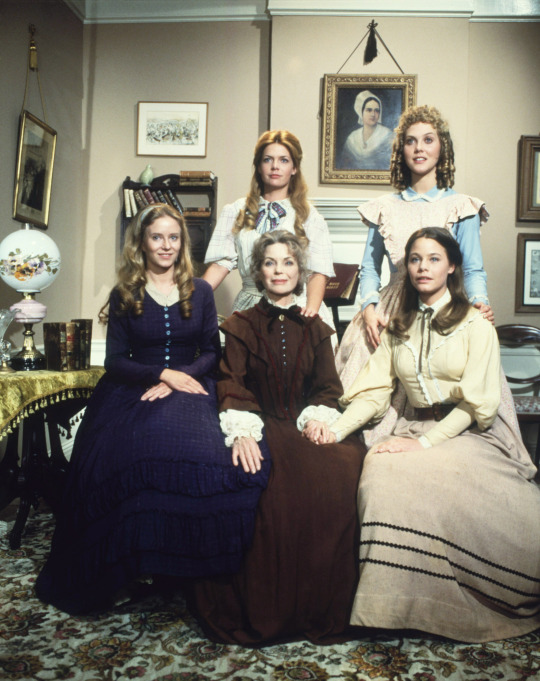
"LITTLE WOMEN" (1978) Review
There have been many adaptations of "Little Women", Louisa May Alcott's 1868 novel. And I have seen most, if not all of the live-action versions. But the first adaptation I have ever seen was NBC's adaptation that first aired back in 1978. If I might be honest, I ended up developing a rather high opinion of it.
Since my first viewing of 1978's "LITTLE WOMEN", I have seen other adaptations. And over the years, I had developed this belief that this television production from 1978 had not been good as I had originally believed. It took many years for me to give this two-part miniseries a second chance. "LITTLE WOMEN" told the story of Josephine (Jo) March and her three sisters during the 1860s - Meg, Beth and Amy. The two-part miniseries opened during the Christmas holidays in December 1861 and follow the sisters, their other family members and friends throughout the Civil War and the early post-war years. Because Jo is the main character, despite being the second sister, this adaptation of "Little Women" has the distinction of being the only version that allows her to serve as narrator.
After my recent re-watch, I could see why my opinion of "LITTLE WOMEN" had diminished over the years . . . at least from a superficial point-of-view. To be blunt, I was not that impressed by the miniseries' production values. The entire production was shot on the Universal Studios backlot and one could sometimes see the California hills in the background. Granted, I still believe set decorator Richard G. Goddard, art director Howard E. Johnson and cinematographer Joseph F. Biroc did the best they could to recreate 1860s Concord, Massachusetts, New York City and Italy. But I did have a problem with the miniseries' costume designs. On the surface, they seemed . . . serviceable for a television production set during the 1860s. But if I must be frank, the costumes also looked as if they had been taken from a costume warehouse for second-rate stage productions. Even worse, all or most of the actresses seemed to be wearing mid-to-late 1970s shoes underneath their mid-19th century dresses and gowns. I was shocked to discover that one of Hollywood's most iconic costume designer, Edith Head, had created the miniseries' costumes. So . . . what on earth happened? Head had created the costumes? "LITTLE WOMEN" was not even Head's first or last period drama. So, what happened?
Did I have any other problems with "LITTLE WOMEN"? Well . . . I did not care for leading actress Susan Dey's hairstyle in the second part of the miniseries. I realize her character, Jo March, had cut her hair to raise funds for her mother's journey to Washington D.C. But her hair never grew back. Never. Instead, it remained shorter than it originally was and styled into a bob. Why? And I had a problem with two particular performances. I will discuss one of them later. The other involved leading lady Susan Dey serving as the miniseries' narrator. Do not get me wrong. Dey is a fine actress and did the best she could. But I found her narration a bit clunky and unnecessary, thanks to the words provided to her by screenwriter Suzanne Clauser's teleplay.
Despite my quibbles, I found a lot to admire about "LITTLE WOMEN". I believe its status as a two-part miniseries, instead of a movie, screenwriter Suzanne Clauser had plenty of opportunities to fully adapt Alcott's novel with less shortcuts and more depth. I have always believed that Alcott's novel was basically a coming-of-age story for Jo March and her three sisters. To me, this made any adaptation of "LITTLE WOMEN" a major character study. And if there is one thing that the two-part miniseries did well was explore its characters and their situations with great depth.
This especially seemed to be the case of Jo's relationship with her neighbor and friend, Theodore "Laurie" Laurence, his personal relationship with his grandfather James Laurence, Amy's European trip and her romantic travails, and Meg's relationship with Laurie's tutor John Brooke. I was especially impressed by the production's handling of Jo's relationship with Professor Friedrich Bhaer. I found it very dynamic, thanks to Suzanne Clauser's screenplay, along with the performances involved. Some, but not all of the adaptations of Alcott's novel tend to forget - at times - that part of it spanned most of the U.S. Civil War. Fortunately, this adaptation never forgot. And as much as I seemed critical of the miniseries' narration, it also reminded television audiences that . . . yes, part of "LITTLE WOMEN" was partially set during the Civil War.
Speaking of performances, "LITTLE WOMEN" had the blessed luck to feature a first-rate cast. I may not have been impressed by the narration provided by Susan Dey (for which I blame another), I was more than impressed by her portrayal of the story's leading character, Josephine "Jo" March. I though she did a superb job in capturing Jo's mercurial personality and obsession with her developing profession as a writer. Meredith Baxter gave an excellent performance as the oldest March sister, Margaret "Meg" March. She conveyed Meg's vanity and obsession with the family's social status and stubborn refusal to give up her love for John Brooke. My only issue is that I believe the actress may have been a bit too old portraying a character that aged from 16 to her early 20s. Eve Plumb portrayed the shy, yet musical Elizabeth "Beth" March. I thought she did an excellent job of combining Beth's emotional, yet retiring nature and in the end, gave a very poignant performance. Ann Dusenberry was roughly 24 to 25 years old when she portrayed the youngest March sibling, Amy. Before my recent re-watch of "LITTLE WOMEN", I had assumed she was too old to portray a younger Amy. But upon my viewing, I realized that she actually managed to give a rather convincing and skillful performance of Amy during the war years (between ages 12 and 16) without to resorting to exaggerated histrionics. And I also admired her portrayal of the older Amy who found herself drawn between two men during her European trip.
I cannot deny that most of the actors who have portrayed Theodore "Laurie"/"Teddy" Laurence over the years gave some pretty damn good performances. But I believe that Richard Gilliland's portrayal of the emotional and moody "Laurie" has to be one of the two best I have ever seen, hands down. His only equal - at least in my eyes - is Jonah Hauer King's performance in the 2017 BBC miniseries. But if I had to choose my favorite portrayal of Laurie's stern, yet warm grandfather, James Laurence, it would be the one given by Hollywood icon Robert Young in this miniseries. May I be frank? I believe both actors provided some of the production's best dramatic moments in their depiction of the developing relationship between grandson and grandfather.
Dorothy McGuire gave a fine performance as Mrs. March aka "Marmie", the four sisters' mother. Thanks to the actress' performance, her Mrs. March seemed more like a well-rounded human being, instead of an archetype. Greer Garson was in fine form as the March family's tart-tongued, yet wealthy matriarch, Aunt Josephine March. William Shatner was excellent as the German-born professor who befriended Jo in New York City, Professor Friedrich Bhaer. Although I found his German accent a bit questionable, I cannot deny that he managed to provide a great deal of energy and complexity to Friedrich's relationship with Jo. Cliff Potts gave a solid performance as Meg's love interest and Laurie's tutor, John Brooke. I can say the same about Virginia Gregg, who portrayed the family's housekeeper, Hannah Mullet. I wish I could provide a better opinion of William Schallert's portrayal of the sisters' father, John March, but his presence in the miniseries seemed very limited, aside from one scene that featured the birth of Meg's children. One performance really failed to impress me and it came from John de Lancie, who portrayed Laurie's English-born classmate from Harvard and Amy's suitor, Frank Vaughan (Fred in the novel). Quite frankly, I found his performance a bit off. Knowing de Lancie for the first-rate actor he truly is, I suspect that between Alcott and screenwriter Suzanne Clauser's writing, the character ended up as a flat, one-note plot device - a situation that not even de Lancie could rise above.
Yes, I had some issues with "LITTLE WOMEN". I found some of the production values questionable, especially some of Edith Head's costumes, the hairstyles and one particular character. But overall, I believe it proved to be a first-rate adaptation of Louisa May Alcott's novel. If I must be frank, thanks to David Lowell Rich's direction, Suzanne Clauser's screenplay and a superb cast led by Susan Dey, I consider the 1978 adaptation of Alcott's novel to be among the three best I have ever seen.
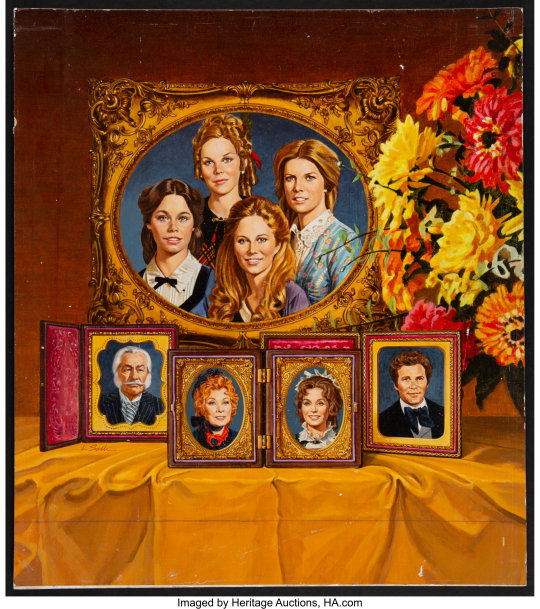
#little women#little women 1978#louisa may alcott#susan dey#jo march#meredith baxter#meg march#eve plumb#beth march#ann dusenberry#amy march#richard gilliland#theodore laurie laurence#dorothy mcguire#marmee march#robert young#greer garson#william shatner#john de lancie#david lowell rich#virginia gregg#cliff potts#u.s. civil war#gilded age#william schallert#joyce bulifant#carlene watkins#period drama#period dramas#costume dramas
11 notes
·
View notes
Photo

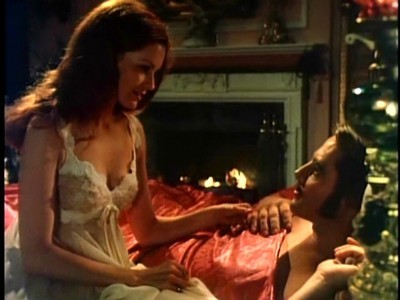

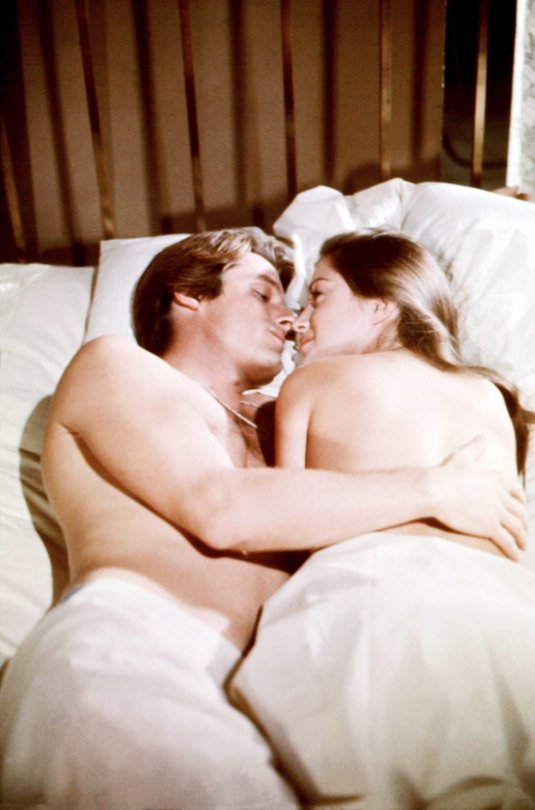
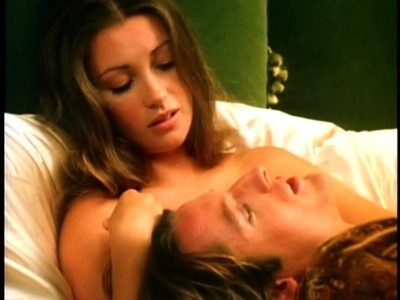
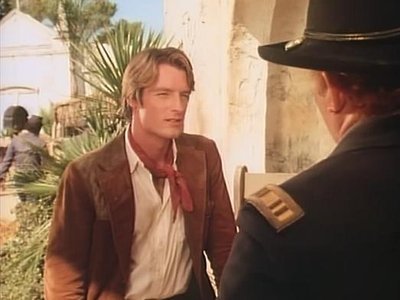




This is the continuation of my Captains and the Kings post.
Chapter V
Additional cast:
Perry King as Rory Armagh
Terry Kiser as Courtney Wickersham
Jane Seymour as Marjorie Chisholm
Douglas Heyes Jr. as Kevin Armagh
Cynthia Sykes as Claudia Desmond
Story:
Tom Hennessey dies and Joseph goes to Elizabeth Hennessey and declares his love for her, undiminished by the many years they have been apart. She reveals that Tom was the father of her son.
They agree that for the sake of his presidential aspirations for his son, he will not divorce Bernadette.
Joseph attempts to bribe Senator Bassett to withdraw his support of the Alien Contract Labor Act. When this fails, he resorts to blackmail. To preserve his honor and keep his family secret, Senator Bassett withdraws his support the only way he can see - by committing suicide. His letter to Joseph tells him that with his dying breath, he has cursed Joseph and all his family.
Bernadette hires a private detective who gives her proof that Joseph is having an affair with Elizabeth. She then gives him an assignment to find proof of her suspicion that Elizabeth's son, Courtney Wickersham is actually Tom Hennessey's son. Bernadette confronts Elizabeth with the proof in an attempt to blackmail her into ending the affair with Joseph. This plan backfires when Elizabeth freely admits the truth and now that Tom is dead, she no longer cares if the secret is revealed.
Joseph tries match-making with his son Rory and Claudia Desmond, the daughter of a business associate.
Rory is smitten with Marjorie Chisholm and asks Courtney Wickersham to introduce them. She has a boyfriend and offers Rory no encouragement. When he continues to pursue her and because he is an Irish Catholic, Rory is severly beaten by her boyfriend and his Harvard classmates. (taken from here again)
Thoughts: Bernadette and Elizabeth fight over Joseph, because the younger woman has discovered her feelings for him, yet the blackmail she had on her stepmother is naughty because all parties already know the truth. Though he has four kids, for Joseph mainly Rory counts and this Bernadette tells him one night drunk. Some years later, Rory was nearly dispelled from his school but his father got him back - and to Harvard where he is with his uncle Courtney and brother Kevin. Still, his father tries to get him together with Claudia Desmond but Rory has other plans with another young woman, Marjorie, at Harvard and takes a several beating from her boyfriend and his friends, just by being Irish.
Chapter VI
Additional cast:
John Houseman as Judge Newell Chisholm
Ann Dusenberry as Ann-Marie
Story:
Undeterred by the beating, Rory is relentless in his pursuit of Marjorie and she eventually falls in love with him. Both of their fathers are strongly opposed to the romance. Judge Chisholm doesn't want Marjorie to marry into an Irish Catholic family, and Joseph insists that Rory must marry an Irish Catholic girl for political reasons. Rory and Marjorie elope and are married by a Justice of the Peace.
Courtney Wickersham and Anne-Marie Armagh are in love and they want to marry. Joseph has to tell Courtney that he is related by blood to Anne-Marie - Tom Hennessey was his biological father and Anne-Marie's grandfather. When they search for Anne-Marie to tell her, they are told that she rode off in a frenzy soon after returning home. Her horse returns without her and when they find her, she has suffered multiple injuries and is in a coma. Bernadette denies having told Anne-Marie that Courtney is a blood relative. Joseph and Elizabeth both feel intense guilt over the secret they kept and the consequences - they never see each other again.
Rory and Marjorie are secretly and happily living together in New York when Joseph summons Rory to join him in London. (taken from here again)
Thoughts: Rory still does his best to win Marjorie and well, it happens: they fall in love with each other, still knowing that their fathers wouldn't approve it. Kevin, however, avenges his brother and beats his brother's attacker to the hospital. For their sister Ann-Marie, it doesn't end good. She falls in love with her uncle Courtney who is in reality related to her. Unfortunately, she falls off her horse and remains in a coma. Joseph accuses Bernadette to have told their child the truth but Bernadette denies it. Meanwhile, Rory listens to Harry's love story and decides to just do what his heart says and marries Marjorie. They settle down while Rory's parents are on a trip through Europe. Desmond becomes the ambassador of the USA in London, and Joseph insists that Rory marries a Catholic girl, not knowing that his son has already wed Marjorie. Oh boy!
Chapter VII
Additional cast:
Lee Jones deBroux as Theodore "Teddy" Roosevelt
John McLiam as Robert
Story:
Joseph takes Rory to meet his rich and powerful friends who intend to "build their own president". Joseph insists that Rory must marry Claudia Desmond with an incentive of 20 million dollars or be disowned with no inheritance. Despite his intention to do so, Rory doesn't have the courage to tell his father about his marriage to Marjorie.
Joseph returns home from London after learning of Rory's marriage by a letter from the Justice of the Peace and in a rage confronts Harry Zieff about hiding this information from him.
America declares war with Spain and young Kevin Armagh joins Teddy Roosevelt's Rough Riders and goes to Cuba to join in the fight.
Joseph meets with Judge Chisholm to discuss a plan to end Rory and Marjorie's marriage. Joseph offers him 10 thousand dollars a month to take Marjorie to Europe for 2 years. He has paid bribes to the Justice of the Peace and the court clerk to remove all evidence of the marriage from the official records. He has also prepared two forged letters to be delivered to Rory and Marjorie, each ending it with the other for personal reasons.
When it is discovered that Kevin has gone to Cuba, Rory travels to Cuba as a "war correspondent" to find him and bring him home. When Rory finally finds Kevin, he has been injured in a sniper attack and he dies in Rory's arms. (taken from here again)
Thoughts: Rory is not happy with how his father manages to dictate his life and realizes bitterly that for him only the money counts. He tells him so in London but can't admit to have married his college love, Marjorie. Still, Joseph finds out and takes his anger out on Harry but both only have the main goal in view: making Rory the first Irish president of the USA. However, soon the war between America and Spain begins and Rory thinks that the powerful friends of his father are behind it. Behind anyone's back, Kevin follows Teddy's army down to Cuba. When the family finally finds out, Rory manages to convince his father to let him go down there as well as a correspondent but as soon as he's there, he's within the war and included. After some asking around, he finally finds his younger brother and helds him until he dies in his arms. Rory is devastated. Meanwhile, Joseph tries to annule the marriage, even with Marjorie's Dad. As said, complicated.
Chapter VIII
Additional cast:
Cliff DeYoung as Brian Armagh
John deLancie as Timothy Armagh (son of Sean)
Story:
When Joseph offers Bernadette a drink before telling her of Kevin's death, she becomes paranoid and thinking that he is trying to poison her, she is apologetic and confesses she told Anne-Marie that she was related to Courtney by blood, but she couldn't have known that it would cause Anne-Marie's accident. After she is told about Kevin, she becomes hysterical and tries to throw herself out of a window. Subdued by Joseph, she says they are all cursed. Bernadette, an alcoholic with severe emotional problems and Anne-Marie, still in a coma, are both sent into care at Woodville.
It's 1912 and Rory Armagh is now a senator, married to Claudia Desmond with four children and plans are under way for his presidential bid.
Joseph's youngest son, Brian has his own financial empire as owner of Xavier Aircraft and Xavier Films. After Joseph suffers a heart attack, he asks Brian to step in as Rory's campaign manager. Rory and Brian go on a coast to coast campaign tour and begin winning multiple primary elections. Winning the Democratic nomination is almost certain for him.
Rory receives a telephone call from Marjorie and he races to her for a passionate reunion. On his deathbed, her father confessed the plan to separate them and she explains it all to Rory. They are just happy that they have found each other again.
Elizabeth dies soon after a visit from Harry, where he discovers that she still loves Joseph. Harry tells Joseph that he wants to retire and travel now that he is 70 and his Emmy is gone.
The powerful financial organization that is backing Rory's bid for the Presidency summons Joseph to a meeting and asks him to have Rory endorse Woodrow Wilson for the Democratic nomination and settle for the Vice Presidential slot on the ticket. Joseph refuses, fearing that he won't live to see Rory elected president.
Joseph telephones Rory to tell him that he no longer has the support of his powerful financial backers. Rory is happy with this news and expresses his intention as President to crush this elite group that uses it's power and money to influence and control world events for financial gain. Joseph cautions him to keep this plan to himself, because it would be suicide for him - and not just politically. Unfortunately, his father-in-law, Charles Desmond has listened in on this call.
Joseph reconciles with his brother Sean and asks for the support of the Labor Unions. Sean agrees to guarantee the Labor vote and it is announced that American Labor endorses Rory Armagh for President.
Rory takes the lead in the race for the Democratic nomination.
Joseph receives a call from Harry, saying he is returning to America on the Titanic and will be back in time to vote for Rory. Joseph receives a final message from Harry delivered by a survivor whose life Harry had saved as the ship was sinking.
With only two weeks left before the Democratic convention in Baltimore, Joseph's hopes and dreams for his son are over when Rory is shot and killed leaving his campaign headquarters in Philadelphia. (taken from here again)
Thoughts: Well, here we are. Rory returns from Cuba, only to find Marjorie gone. Bernadette doesn't take it well when being informed about her son's death, and so she and her daughter go to a sanatory. After a heart attack, Joseph asks his youngest son Brian to help Rory with his campaign. Brian seems to be more his father's son, own companies and money, yet he helps and gets the shock of his life to find out that Rory is actually married to two women but for Rory only Marjorie counts and they reconcile. Still, he's married to Claudia and this marriage doesn't work. When Joseph's people decide to vote for Wilson, Joseph gets angry and steps out, only to speak with his brother Sean again - and to let the labour vote for Rory. After a meeting with Marjorie and the next stop in Philadelphia, Rory talks to Brian, yet at the moment a man in the crowd shots him from a close range and he dies in his wife's arms. Marjorie then goes to Joseph and he accepts their marriage finally. Meanwhile, Harry loses his life on the Titanic. In the end, Joseph is a broken man.
That’s a very long miniseries and I really liked it. Very recommended if you have once a lot of time. It’s around nine hours to watch.
#captains and the kings#1976#tv mini series#chapters 5-8#based on book#richard jordan#harvey jason#robert vaughn#patty duke#blair brown#david huffman#katherine crawford#perry king#terry kiser#jane seymour#douglas heyes jr#cynthia sykes#john houseman#ann dusenberry#lee jones debroux#john mcliam#cliff de young#john delancie#family dynasty#influence#politics#money#advantage#immigrants#irish
4 notes
·
View notes
Text
Blu-ray review: “Cutter’s Way” (1981)
“Cutter’s Way” (1981)
Drama
Running Time: 109 minutes
Written by: Jeffrey Alan Fiskin based on Cutter and Bone by Newton Thornburg
Directed by: Ivan Passer
Featuring: Jeff Bridges, John Heard, Lisa Eichhorn and Ann Dusenberry
Alex Cutter: “I watched the war on TV like everybody else. Thought the same damn things. You know what you thought when you saw a picture of a young woman with a baby…

View On WordPress
#Ann Dusenberry#bluray#bluray review#Cutter&039;s Way#Cutter&039;s Way bluray#Cutter&039;s Way bluray review#Cutter&039;s Way review#Ivan Passer#jeff bridges#John Heard
0 notes
Text
Please reblog for a larger sample size.
3 notes
·
View notes
Text

Ann Dusenberry - promotional photo for Jaws 2 (1978)
5 notes
·
View notes
Text
Little Women: Amy and Laurie Scene 1978
Little Women: Amy and Laurie Scene 1978
Richard Gilliland as Laurie and Anne Dusenberry as Amy in the 1978 series.
Start your own Etsy shop and get the first 40 listings for free
youtube
View On WordPress
2 notes
·
View notes
Text

NATIONAL LAMPOON GOES TO THE MOVIES (1982)
"Yo, this was like my senior thesis examination for Gazelle Project. And I fucking passed. Required me to know which dusty old movies these dusty old spoofs are spoofing. The first was like a KRAMER VS. KRAMER / ANNIE HALL vorce flick about 70's journeys for self-growth. The second was basically LACE or THE BITCH with perf new crush Anne Dusenberry as the jezebel who globetrots her way to wealth and power. It's even got an Anthony Quinn parody a'la THE GREEK TYCOON. Then we got Robby Benson, who has impressed me once again with his unsung comic talents, as a SERPICO / DIRTY HARRY rogue cop on the hunt for serial killer Christopher Lloyd. You know what? This movie rrrrrrrrrocks."
-Sonny Gazelle
0 notes
Text
THE POSSESSED (1977) – Episode 180 – Decades Of Horror 1970s
“I was kicked out of the church. I drank too much. I lusted. I was an adulterer… and other things.” Join your faithful Grue Crew – Doc Rotten, Chad Hunt, Bill Mulligan, and Jeff Mohr – as they take on yet another made-for-TV horror movie, The Possessed (1977). Pssst . . . this one has some surprises in the cast.
Decades of Horror 1970s
Episode 180 – The Possessed (1977)
Join the Crew on the Gruesome Magazine YouTube channel!
Subscribe today! And click the alert to get notified of new content!
https://youtube.com/gruesomemagazine
A former priest, now an exorcist, battles the Satanic forces that are threatening the students at a school for girls.
Director: Jerry Thorpe
Writer: John Sacret Young
Selected cast:
James Farentino as Kevin Leahy
Joan Hackett as Louise Gelson
Harrison Ford as Paul Winjam
Claudette Nevins as Ellen Sumner
P. J. Soles as Marty
Diana Scarwid as Lane
Eugene Roche as Sergeant Taplinger
Ann Dusenberry as Louise “Weezie” Summer
Dinah Manoff as Celia
Carol Jones as Alex
Made-for-TV horror movies in the Seventies are the go-to for any monster kids growing up during that time, gathering around the tube with the family to watch chilling favorites such as The Night Stalker (1972), Duel (1971), Gargoyles (1972), and Trilogy of Terror (1975). Whoa boy, those were the times. Many a time the film was to serve as a pilot for a TV series ala Kolchak. With a familiar cast (P.J. Soles, James Farentino, Joan Hackett, and more), The Possessed (1977) would make an attempt at such a lofty goal only to miss the mark. Regardless, those who saw the film may remember the nail-spitting, cackling creepy lady at the end, or fans of Indiana Jones and Han Solo star Harrison Ford may seek this one out to catch his last role prior to Star Wars (1977). Sadly, time has not been kind to this post-Exorcist attempt at the supernatural but the Grue-Crew review it all the same.
If you’d like to check out other made-for-TV horror gems covered by the 70s Grue-Crew, take a listen to these:
DRACULA (1974) — Episode 61
SALEM’S LOT (1979) — Episode 69
SUMMER OF FEAR (1978) — Episode 79
THE NIGHT STALKER (1972) — Episode 84
THE NIGHT STRANGLER (1973) — Episode 87
TRILOGY OF TERROR (1975) – Episode 108
GARGOYLES (1972) – Episode 131
THE LEGEND OF LIZZIE BORDEN (1975) – Episode 177
At the time of this writing, The Possessed is available to stream from YouTube. In terms of physical media, the film is currently available as a DVD from the Warner Brothers Archive Collection.
Gruesome Magazine’s Decades of Horror 1970s is part of the Decades of Horror two-week rotation with The Classic Era and the 1980s. In two weeks, the next episode in their very flexible schedule will be The Brotherhood of Satan (1971), from the production company that brought you A Boy and His Dog (1975), starring Strother Martin, L.Q. Jones, Alvy Moore, Charles Bateman, and Ahna Capri.
We want to hear from you – the coolest, grooviest fans: comment on the site or email the Decades of Horror 1970s podcast hosts at [email protected].
Check out this episode!
0 notes
Text
Assistir Filme Obstinação Online fácil
Assistir Filme Obstinação Online Fácil é só aqui: https://filmesonlinefacil.com/filme/obstinacao/
Obstinação - Filmes Online Fácil

Em uma noite chuvosa, o carro de Richard Bone (Bridges) quebra em um beco, ele então vê um carro misterioso surgir e um homem despeja algo em uma lata de lixo. No começo, Bone não pensa sobre o ocorrido e vai se encontrar com o seu amigo, Alex Cutter (Heard). No dia seguinte, uma jovem garota é encontrada brutalmente assassinada no mesmo beco onde Bone abandonou seu carro e torna-se o principal suspeito do crime. Bone vê o homem que acha que é o assassino em uma parada mais tarde naquele dia - o magnata local JJ Cord (Stephen Elliott) - Cutter começa a ter um interesse no mistério que se desenrola. Seu interesse logo se torna uma teoria da conspiração que se desenvolve em uma investigação incômoda com seu amigo cético e a irmã da garota morta (Ann Dusenberry).
0 notes
Text
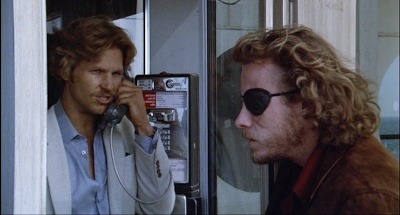
Cutter’s Way • Director Ivan Passer
#megans watching#cutters way#ivan passer#jeff bridges#Jeffrey Alan fiskin#john heard#Lisa eichhorn#Ann dusenberry
11 notes
·
View notes
Text
My Ranking of the “LITTLE WOMEN” Adaptations
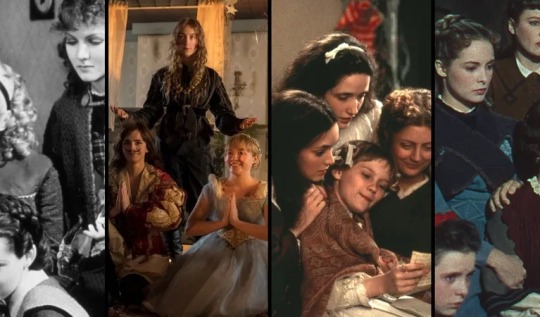
Below is my ranking of the movie and television adaptations of “LITTLE WOMEN”, Louisa May Alcott’s 1868-69 novel:
MY RANKING OF THE “LITTLE WOMEN” ADAPTATIONS

1. “Little Women” (BBC; 2017): adapted by Heidi Thomas and directed by Vanessa Caswill

2. “Little Women” (1994): directed by Gillian Armstrong and adapted by Robin Swicord
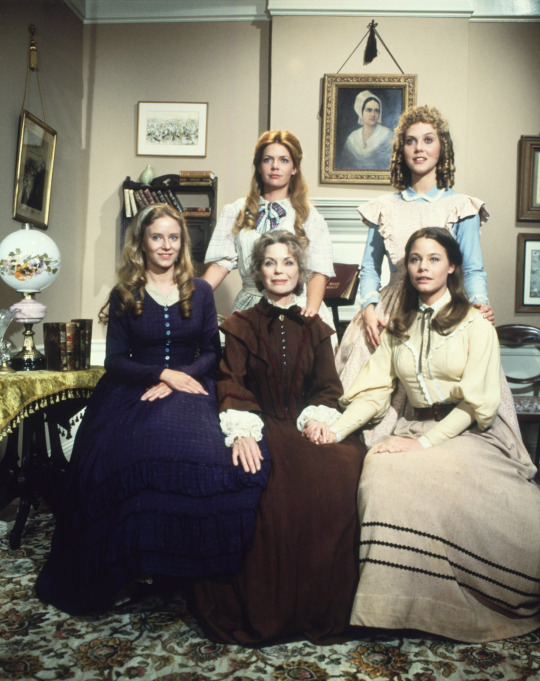
3. “Little Women” (NBC; 1978): directed by David Lowell Rich and adapted by Suzanne Clauser
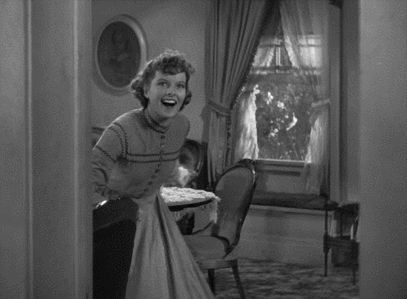
4a. “Little Women” (1933): directed by George Cukor and adapted by Victor Heerman and Sarah Y. Mason [tie]
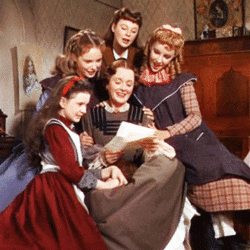
4b. “Little Women” (1949): directed by Mervyn LeRoy and adapted by Victor Heerman and Sarah Y. Mason [tie]
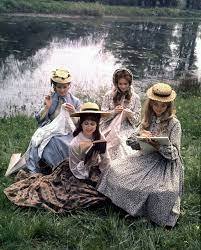
5. “Little Women” (BBC: 1970): directed by Paddy Russell and adapted by Denis Constanduros and Alistair Bell
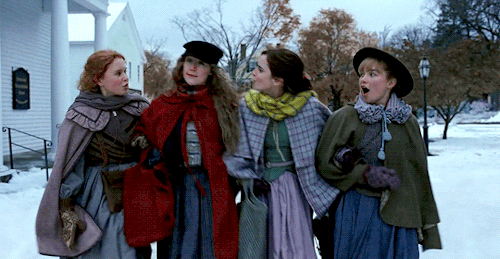
6. “Little Women” (2019): adapted and directed by Greta Gerwig
#little women#louisa may alcott#little women 1933#little women 1949#little women 1970#little women 1978#little women 1994#little women 2017#little women 2019#david lowell rich#suzanne clauser#dorothy maguire#susan dey#eve plumb#meredith baxter#ann dusenberry#greta gerwig#saoirse ronan#florence pugh#Emma Watson#eliza scalen#denis constandurous#alistair bell#jo rowbottom#janina faye#angela down#sarah craze#paddy russell#george cukor#victor heerman
51 notes
·
View notes
Photo
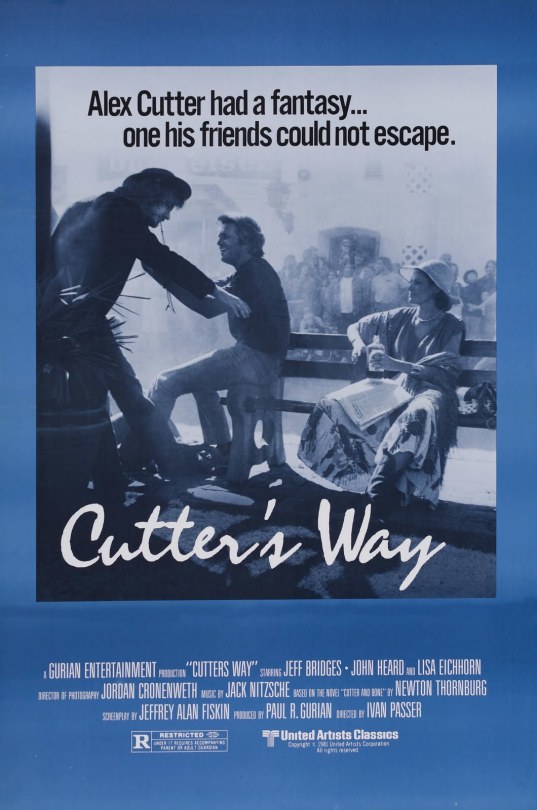
2 notes
·
View notes
Text
Ever since “Little Women” came out seven months ago, I have encountered articles and talk show in which Florence Pugh was praised for not portraying Amy March as a villain. I have nothing against Pugh, but this praise strikes me as false. Amy March was never a villain. I have never regarded her as a villain. Nor do I believe that Joan Bennett, Elizabeth Taylor, Ann Dusenberry, Kirsten Dunst, Samantha Mathis or Kathryn Newton; who have portrayed the character in the past, have ever portrayed her as one. Amy did one terrible thing in the story - burn Jo's manuscript in a fit of a childish need to get revenge for a slight. In the end, she was genuinely remorseful for her act. Having to encounter praise over Pugh for not portraying Amy as a villain is just plain ridiculous to me.
#little women#little women 2019#anti media#florence pugh#amy march#joan bennett#elizabeth taylor#ann dusenberry#kirsten dunst#samantha mathis#kathryn newton
78 notes
·
View notes
Video
youtube
You all knew it was coming! in general, the Little Women adaptations from the 1970s do a good job with Amy and Laurie and show him wanting to better himself for her (which never happens in Little Women film adaptations apart from 1994). They do romanticize Jo´s and Laurie´s relationship as well, mainly not pointing out their differences (and him harassing her) and young Amy being played by an adult pitting her and Jo against one another and also Jo and Friedrich tend to argue in these versions more than Jo and Laurie, which is opposite to the novel.
#little women#jo march#laurie lawrence#little women 1978#little women 1970#bbc little women#richard gilliland#ann dusenberry#william shatner#susan dey#jo x laurie#anti jo x laurie#love and hate the 70s#amy x laurie#amy march#friedrich bhaer
21 notes
·
View notes

